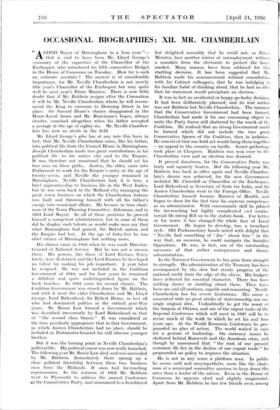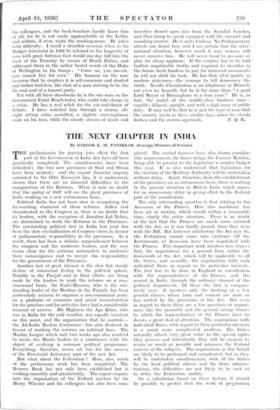OCCASIONAL BIOGRAPHIES: XH. MR. CHAMBERLAIN
"AGOOD Mayor of Birmingham in a lean year "— that is said to have been Mr. Lloyd :George's summary of the capacities of the Chancellor of the Exchequer, who introduced his fifth consecutive Budget in the House of Commons on Tuesday. How far is such an estimate accurate ? The answer is of considerable importance, for Mr. Neville Chamberlain is not merely this year's Chancellor of the Exchequer but may quite well be next year's Prime Minister. There is now little doubt that if Mr. Baldwin resigns after the Coronation it will be Mr. Neville Chamberlain whom he will recom- mend the King to summon to Downing Street in his place. Sir Samuel Hoare's chance disappeared in the Hoare-Laval fiasco and Mr. Runciman's hopes, always slender, vanished altogether when his father accepted a peerage at the age of eighty-six. Mr. Neville Chamber- lain has now no rivals in the field.
Mr. Lloyd George's gibe has at any rate this basis in fact, that Mr. Neville Chamberlain came, like his father, into political life from the Council House in Birmingham. Joseph Chamberlain made two great contributions in his political life—to his native city and to the Empire. It was therefore not unnatural that he should set his two sons on those paths. Austen, the elder, came into Parliament to work for the Empire's unity at the age of twenty-seven, and Neville the younger remained in Birmingham. Neville Chamberlain had, it is true, a brief apprenticeship to business life in the West Indies, but he was soon back in the Midland city managing the great screw business on which the Chamberlain fortune was built and throwing himself with all his father's energy into municipal affairs. He became in turn chair- man of the Town Planning Committee, Alderman, and in 1915 Lord Mayor. In all of these positions he proved himself a competent administrator, but in none of them did he display such talents as would make men say that what Birmingham had gained, the British nation and the Empire had lost. At the age of forty-five he was chief citizen of Birmingham but nothing more.
His chance came in 1916 when he was made Director- General of National Service. But he was not a success there. His powers, like those of Lord Eustace Percy lately, were ill-defined, and like Lord Eustacc he developed no talent for making his job important. A year later he resigned. He was not included in the Coalition Government of 1918, and for four years he remained a diffident and quite undistinguished figure on the back benches. In 1922 came his second chance. The Coalition Government was struck down by Mr. Baldwin, and with it went the elder Chamberlain and Mr. Lloyd George, Lord Birkenhead, Sir Robert Home, in fact all who had dominated politics in the critical post-War years. Mr. Bonar Law formed a Government which was described irreverently by Lord Birkenhead as that of "the second class brains." It was considered at the time peculiarly appropriate that in that Government, in which Austen Chamberlain had no place, should be included as Postmaster-General his still obscure younger brother.
But it was the turning point in Neville Chamberlain's political life. His political career was now really launched. The following year Mr. Bonar Law died, and was succeeded by Mr. Baldwin. Immediately there sprang up a close political friendship between these two business men from the Midlands. It soon had far-reaching repercussions. In the autumn of 1928 Mr. Baldwin went to Plymouth to address the annual Conference of the Conservative Party, and announced to a bewildered but delighted assembly that he could not, as Prime Minister, face another winter of unemployment without a mandate from the electorate to protect the home market. Many reasons have been adduced for this startling decision. It has been suggested that Mr. Baldwin made his announcement without consultation with his Cabinet colleagues, that he was indulging in his familiar habit of thinking aloud, that he had no idea that his statement would precipitate an election.
It was in fact no accidental or happy-go-lucky decision. It had been deliberately planned, and its real author was not Baldwin but Neville Chamberlain. The moment that the Conservative Government had been formed, Chamberlain had made it his one consuming object to unite the Party forces still shattered by the wreck of th Coalition. He realised that no strong Government could be formed which did not include the two great Conservative figures of the Coalition, then in isolation. He conceived that one bold act would bring them together —an appeal to the country on tariffs. Secret gatherings took place at Chequers. Baldwin was won over to the Chamberlain view and an election was decreed.
It proved disastrous, for the Conservative Party was fairly and squarely beaten. But the following year Mr. Baldwin was back in 'office again and Neville Chamber- lain's dream was achieved, for the new Government included Mr. Churchill as Chancellor of the Exchequer, Lord Birkenhead as Secretary of State for India, and Sir Austen Chamberlain went to the Foreign Office. Neville Chamberlain himself became Minister of Health, and began to show for the first time his supreme competence as an administrator. With consummate skill he piloted the far-reaching but highly complicated ml contro- versial De-rating Bill on to the statute-book. For better or for worse it has changed the whole face of Local Government. He began to develop, too, a trenchant style. Old Parliamentary hands noted with delight that "Neville had something of 'Joe' about him" in the way that, on occasion, he could castigate the Socialist Opposition. He was, in fact, one of the outstanding successes of that rather unimpressive and dreary administration.
In the National Government he has gone from strength to strength. His administration of the Treasury has been accompanied by the slow but steady progress of the national credit from the edge of the abyss. His budgets have reflected his essential character. There has been nothing showy or startling about them. They have been one and all cautious, capable and reassuring. Neville Chamberlain has his severe limitations. His name is associated with no great stroke of statesmanship nor one single original idea. Undoubtedly he got the worst of the bargain at Ottawa, and one of the urgent tasks of the Imperial Conference which will meet in 1937 will be to revise much of the work to which he set his seal four years ago. At the World Economic Conference he pro- pounded no plan of action. The world waited in vain for a gesture of leadership. On currency issues he sheltered behind Roosevelt and the American crisis, and though he announced that "the root of our present economic ills lies in the decline of our export trade" he propounded no policy to improve the situation.
He is not in any sense a platform man. In public he seems cold and unsympathetic, more like the chair- man of a municipal committee anxious to keep down the rates than a leader of the nation. Even in the House of Commons he appears aloof and slightly magisterial. Apart from Mr. Baldwin he has few friends 'even among his colleagues, and the back-benchers hardly know him at all,_ for he is not easily approachable in the Lobby and seldom, if ever, visits the smoking-room. He jokes with difficulty. I recall a dreadful occasion when in his Budget statement in 1932 he referred to the longevity of men with great fortunes that would one day fall into the maw of the Treasury by means of Death Duties, and addressed them in the rather brutal words of the Duke of Wellington to his troops : "Come on, you rascals, you cannot live for ever." His humour on the rare occasion that he employs it is self-conscious and studied and rather tasteless, like that of a man striving to be the life and soul of a funeral party.
Yet with all these drawbacks he is the one man on the Government Front Bench today who could take charge in a crisis. He has a real relish for the cut-and-thrust of debate. I have watched him through a stormy all- night sitting calm, unruffled, a slightly contemptuous smile on his face, while the steady stream of insult and invective flowed upon him from the Secialist benches, and then rising to speak equipped with the succinct and smashing answer. He is quite fearless: No Parliamentary attack can daunt him, and I am certain that the inter- national situation; however much it may worsen, will never unnerve him. He will never bend to pressure or play for cheap applause. If the country has to be told further unpalatable truths and required to shoulder in the future fresh burdens to pay for increased armaments he will not shirk his task. He has that vital quality in modern statesmen—the courage to tell democracy the truth. Neville Chamberlain is no Gladstone or Disraeli, nor even an Asquith, but he is far more than "a good Lord Mayor of Birmingham in a lean year." He is, in fact, the model of the middle-class business man— capable, diligent, upright, and with a high sense of public duty. It may well be that he is just the type of man that the country needs in these sombre days when the clouds darken and the storms approach. P. Q. R.



















































 Previous page
Previous page